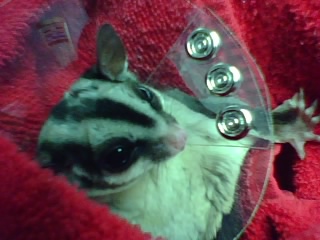ARTEX - Kidney Failure
I am telling Artex's story because his diagnosis did not come like some would think, and I hope others can learn from it.
Artex came to me as a rescue when he became ill and his caregiver did not want to continue vet visits or put the time into helping him get well. When I first got the call, I insisted that she meet me at the vet's office because her description of Artex's behavior was very grim.
Artex was seen by the vet. He presented with droopy ears, a bad smell, extreme lethargy, crabbing and lunging/biting, and was found to be SEVERELY dehydrated. We were unable to get urine for testing because he was so dehydrated.
Fecals were clear - no signs of ANYthing. SNAP test was clear. It was clear that there was something wrong - SOMEthing was causing the dehydration. vet did not feel he was strong/healthy enough for much more testing at the time, and really did not think he would live much longer.
Sub-Q fluids were administered in the office and we decided to treat for a parasite and an infection just to try to get to the cause of the dehydration - suspecting that he probably had a UTI or some other infection.
So, he was prescribed Panacur and TMPS. Throughout the course of treatment, I had to administer sub-q fluids twice daily. Artex really perked up and began eating and playing like a normal little one.
Treatment ended. Artex is active (but sluggish early on) and no longer crabby/lunging/biting. He eats everything he is given every night. He plays well, and LOOKS great. If I didn't know he was dehydrated from tent testing, I would not think anything was wrong
He also drinks
2-4 OUNCES of liquid every night. Yet, he remains dehydrated. I have to sub-q 5-6 days per week/ 1-3 times per day depending upon his need.
Liquids I offered are filtered water, pedialyte, gatorade, and/or a 50/50 mix of gatorade/pedialyte and water. He always has fresh water in his water bottle. These liquids are being offered (and taken) in ADDITION to his regular fresh water.
Because the dehydration persisted, we returned to the vet. Again, fecals and UA are negative. We decide to culture the urine just to be sure, but still find nothing. We treat again just in case there is a low grade infection that we are not finding. This time treat with Clavamox.
No change. this continued for 7 weeks. Artex remained active (after fluids given) with a good appetite, drinks 2-4 ounces of liquid each night, eliminates well. Yet, he was dehydrated. He was sluggish when he first wakes, so I started waking him in the afternoon (between 2-4) and offering liquids or sub-quing if necessary. By doing this, I was able to decrease the need to sub-q to about once per week.
Just to be sure I am not crazy or overlooking anything, I had Shawna give him a look over and tent test and all when she was visiting. His dehydration ranges from mild to severe. Poor thing was tent tested more than any glider ever before. Shawna observed his dehydration at moderate-severe and also at mild.
His third vet visit was his first visit with Dr. Walsh. This time we were able to draw blood.
Levels were:
ALT 46
AST 50
BUN 23
CREA 0.4
GLU 135
AMYL 680
Ca 7.9
Chol 146
Phos 3.9
TBIL 3.6
UA and fecals again clear. He was dehydrated in the vet office. Again, I left the office with all I needed to continue sub-quing long term if need be.
Given his symptoms and the persistence of them, Dr. Walsh suspected that he might have some kidney involvement. This is very sad, as he is only 9 months old. So, Dr. Walsh advised me to put Artex on a very low protein diet. Most of the glider diets we use are quite high in protein, so we modified my particular diet to include very little protein - with the only animal protein being 1/3 hardboiled egg per batch of food.
Artex did well on this diet and got a cage mate. I noticed that the amount of fluid he was drinking each night was decreasing, and he was not needing sub-Q fluids as frequently. He remained a happy, active glider with a great appetite.
8 weeks later, Artex returned for follow-up blood work. Levels this time indicated that he was in renal failure. :( This is the part I want others to take from this - his kidney levels were within normal range upon his first test, but because his symptoms were so significant, we sometimes have to look at it differently. It is kinda like this: MY normal temperature is low (97.4). This is normal for me. So, when I have a temperature of 98.6, which is what we call "normal", well, that is a fever for me. A temperature of 99.0 for me is a pretty good fever. So, Dr. Walsh suspected this was the case with Artex - what may be a "normal" reading on AVERAGE, may not be so normal for Artex. Unfortunately, changing his diet and retesting verified this. Dr. Walsh believes that his condition is genetic, and possibly/likely the result of inbreeding (I have learned that his parents were likely a mother/son pairing)
Artex is 1 year old now. He is a very young glider living with a very serious problem. I don't know what the future brings for him, but I know he will be loved while he is here and will receive the very best of health care throughout his life- which I hope will be a long one.
